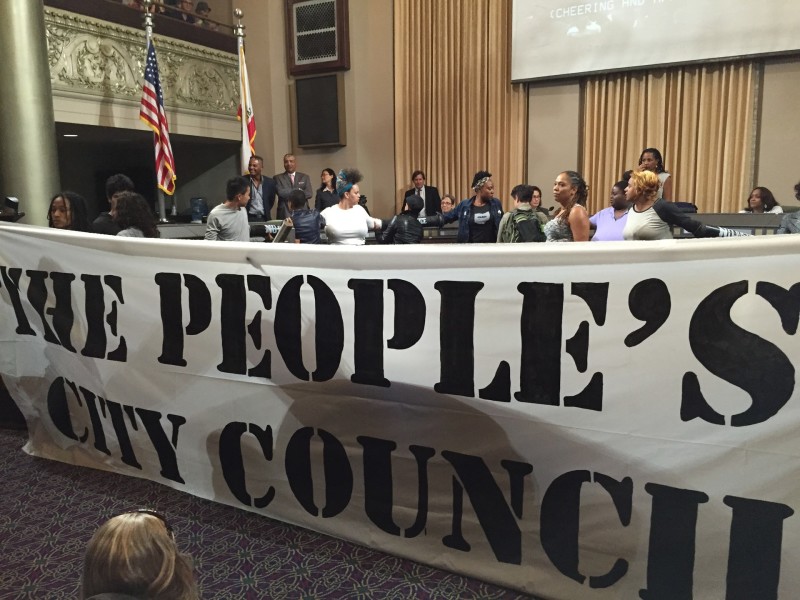Peter Scheer of the First Amendment Coalition said the city may well be playing fast and loose with local transparency laws.
"Given the Brown Act's clear admonitions that all persons, quote unquote, shall be given access to the meeting, any city council which closes its doors when there are still many empty seats available -- and does that as a matter of policy -- has an obligation to explain itself," he said. "And to have a fact-based plausible explanation and reason."
The official word from the city has been public safety concerns. The City Council is responsible for overseeing its meetings, but the city administrator is responsible for building policy. The current city administrator, John Flores, is a temporary hire who might have been on vacation when the decision was made to limit the number of people allowed into council meetings.
The city administrator's office has not returned KQED's request for comment or explanation.
City Councilwoman Desley Brooks said the reason is clear to her. "If you look at the timeline" she said, "to me the balconies were closed when the people came out on East 12th Street."
She was referring to a heated meeting in early May in which activists took over the meeting and declared it the people's council. "I know that there is a different story that they will put out -- but that is the backstory," she said.
After that May 5 meeting, an increased police presence and empty balconies became a hallmark of Oakland City Council meetings. Brooks said it had a real effect on preventing citizens from speaking.
"There were 100 or something people signed up to speak, and less them half of them spoke," she said. "That's not what we want."
Brooks said people may have been angry, but that is all part of messy democracy. "Sometimes people have a right to be angry, and they need to be angry," she said.
Activist Monica Garcia, who was at many of those meetings, agreed that there is a deep well of anger among activists. "Basically what happened is folks were angry and upset -- about many, many things -- but it crystallized around this issue: the giveaway of public lands, budgets that aren't for the people."
Garcia, a 12-year Eastlake resident, said shutting people out of the meetings created a chilling effect and only increased feelings of frustration and anger. She added that the public safety issue was a smoke screen, even on the night the council was shut down.
"There was no violence of any kind," she said. "No one was threatened, the council was encouraged to stay -- people want to speak to you!"
Garcia said even that with the contentious relationship between activists and government in the past few years, things are now reaching a boiling point. She mentioned not just the closure of the council meetings, but also Mayor Libby Schaaf's recent crackdown on after-dark protests.
"I think it's alarming how tone-deaf the mayor is -- she would choose to start trying to roll out these laws on a night of protest for black women," she said. She was referring to the #SayHerName march in Oakland, made up mostly of black women and children, in which police first started enforcing the mayor's new policy.
"It says a lot about who Oakland is for," Garcia said.
It should be noted that Schaaf's office is not responsible for the City Council's gallery closure. The mayor has no control over City Council meetings.
Tonight, Oakland City Council and its balconies will be open again. What happens three weeks from now, when the temporary restraining order ends, is still unclear. What is clear is what is at stake in the meeting this evening.
The City Council will probably finalize its controversial budget, and it is likely that many will be on hand to share their views of the state of the city.
